-
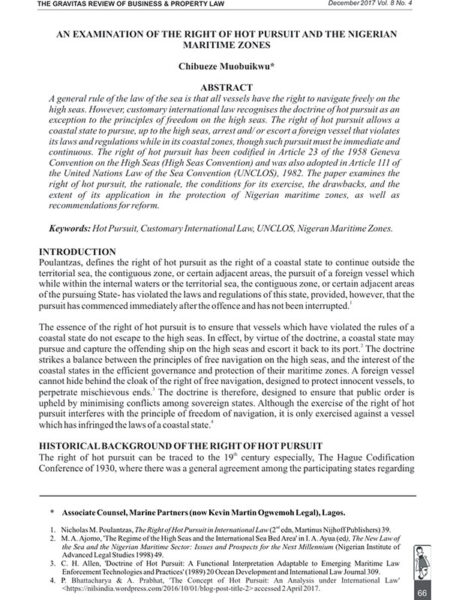
An Examination of the Right of Hot Pursuit and the Nigerian Maritime Zones
0₦2,500.00Chibueze Muobuikwu, Associate, Marine Partners, conducts “An Examination of the Right of Hot Pursuit and the Nigerian Maritime Zones”. He explains that the customary international law right of hot pursuit, allows a coastal state to pursue, up to the high seas, arrest and/or escort a foreign vessel that violates its laws and regulations while in its coastal zones. He notes that the right of hot pursuit has been codified by the Geneva Convention on the High Seas 1958, and adopted by the United Nations Law of the Sea Convention 1982. Chibueze examines the right of hot pursuit, the rationale, the conditions for its exercise, and the drawbacks, and the extent of its application in the protection of Nigerian maritime zones.
-
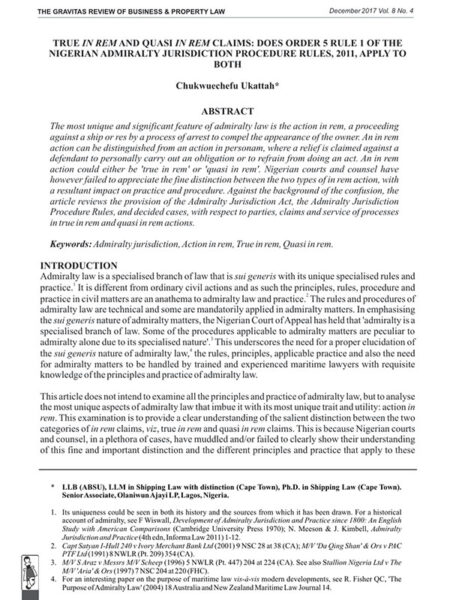
True in Rem and Quasi in Rem Claims: Does Order 5 Rule 1 of the Nigerian Admiralty Jurisdiction Procedure Rules 2011, Apply to Both
0₦2,500.00Dr. Chukwuechefu Ukattah, Senior Associate, Olaniwun Ajayi LP, in his article, “True In Rem and Quasi In Rem Claims: Does Order 5 Rule 1 of the Nigerian Admiralty Jurisdiction Procedure Rules, 2011, Apply to Both?”, notes that an in rem action could either be ‘true in rem’ or ‘quasi in rem’. He argues that Nigerian courts and counsel, have however failed to appreciate the distinction between the two types of in rem action, with a resultant impact on practice and procedure. Against the background of the confusion, he reviews the provision of the Admiralty Jurisdiction Act, the Admiralty Jurisdiction Procedure Rules, and decided cases, with respect to parties, claims and service of processes in true in rem and quasi in rem actions.
-
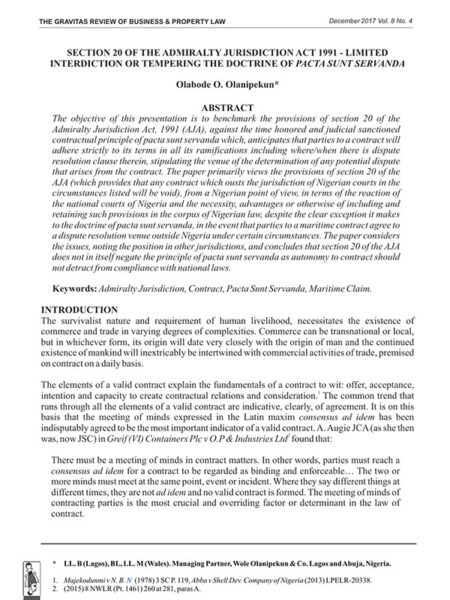
Section 20 of the Admiralty Jurisdiction Act 1991 – Limited Interdiction or Tempering the Doctrine of Pacta Sunt Servanda
0₦2,500.00Olabode Olanipekun, Managing Partner, Wole Olanipekun & Co, in his article, “Section 20 of the Admiralty Jurisdiction Act 1991 – Limited Interdiction or tempering the Doctrine of Pacta Sunt Servanda“, benchmarks the provision of section 20 of the Admiralty Jurisdiction Act, 1991, which invalidates any contractual provision that ousts the jurisdiction of Nigerian courts in the circumstances listed in the section, against the time honored and judicial sanctioned contractual principle of pacta sunt servanda, which anticipates that parties to a contract will adhere strictly to its terms in all its ramifications including the venue of the determination of any dispute that arises from the contract. He reviews the issues against the background of decided cases, noting the position in other jurisdictions, and concludes with a thought on the Hamburg Rules and dispute resolution.
-
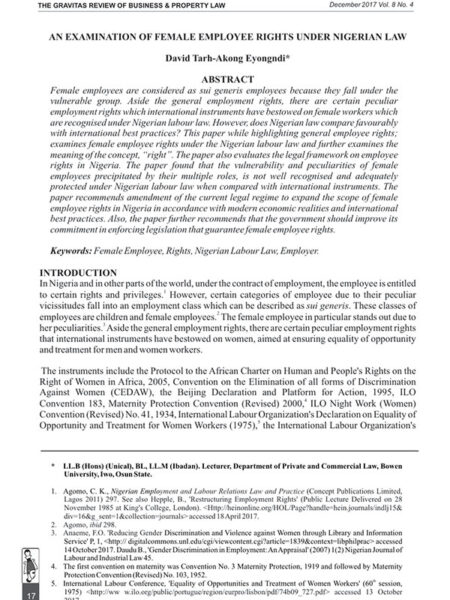
An Examination of Female Employee Rights under Nigerian Law
0₦2,500.00David Eyongndi of the Department of Private and Commercial Law, Bowen University, Iwo, in his article, “An Examination of Female Employee Rights Under Nigerian Law“, examines employment rights that are peculiar to women in Nigeria. He identifies laws and regulations that discriminate against women, and recommends an improvement in the current legal regime to expand the scope of female employee rights in Nigeria in accordance with modern economic realities and international best practices.
-
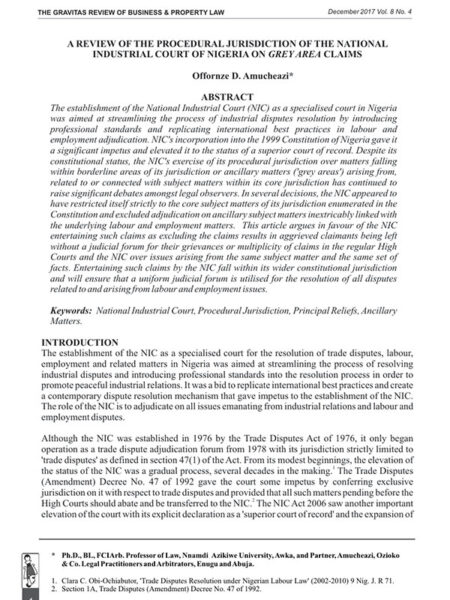
A Review of the Procedural Jurisdiction of the National Industrial Court of Nigeria on Grey Area Claims
0₦2,500.00Professor Offornze Amucheazi of Nnamdi Azikiwe University, Awka, and Partner, Amucheazi, Ozioko & Co, in his article, “A Review of the Procedural Jurisdiction of the National Industrial Court of Nigeria on Grey Area Claims”, examines the National Industrial Court’s exercise of jurisdiction over ancillary matters ‘arising from, related to or connected with’ subject matters within its core jurisdiction. He argues that despite being empowered in that regard, the NIC, from a review of several cases, appears to have restricted itself strictly to the core subject matters of its jurisdiction enumerated in the Constitution, and excluded adjudication on ancillary subject matters inextricably linked with the underlying labour and employment matters. He concludes that this cautious approach may leave aggrieved claimants without a judicial forum for their grievances, or lead to multiplicity of claims in different courts over issues arising from the same subject matter and the same set of facts.
-
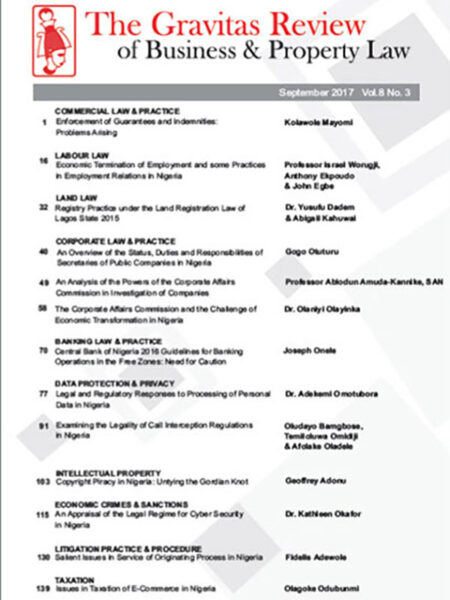
The Gravitas Review of Business & Property Law Vol.8 No.3 – Print
0₦5,000.00In this issue of The Gravitas Review of Business & Property Law Vol.8 No.3, there are well researched articles on:
- Commercial Law & Practice
- Labour Law
- Land Law
- Corporate Law & Practice
- Banking Law & Practice
- Data Protection & Piracy
- Intellectual Property
- Economic Crimes & Sanction
- Litigation Practice & Procedure
- Taxation
-

The Gravitas Review of Business & Property Law Vol.8 No.3 – E-Book
0₦5,000.00In this issue of The Gravitas Review of Business & Property Law Vol.8 No.3, there are well researched articles on:
- Commercial Law & Practice
- Labour Law
- Land Law
- Corporate Law & Practice
- Banking Law & Practice
- Data Protection & Piracy
- Intellectual Property
- Economic Crimes & Sanction
- Litigation Practice & Procedure
- Taxation
-

The Gravitas Review of Business & Property Law Vol.8 No.3
0₦5,000.00In this issue of The Gravitas Review of Business & Property Law Vol.8 No.3, there are well researched articles on:
- Commercial Law & Practice
- Labour Law
- Land Law
- Corporate Law & Practice
- Banking Law & Practice
- Data Protection & Piracy
- Intellectual Property
- Economic Crimes & Sanction
- Litigation Practice & Procedure
- Taxation
-
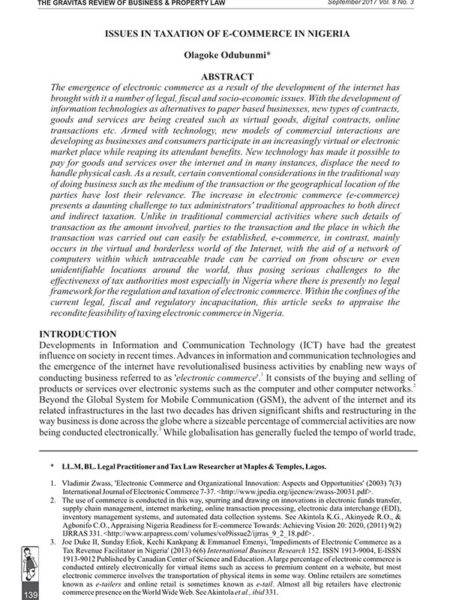
Issues in Taxation of E-Commerce in Nigeria
0₦2,500.00Olagoke Odubunmi, Legal Practitioner and Tax Law Researcher at Maples & Temples, in “Issues in Taxation of E-Commerce in Nigeria”, argues that the main difficulty that electronic commerce poses for the Nigerian tax system stems from the fact that extant national laws governing income taxation are premised on the assumptions of physical presence of parties to business transactions. With the need for physical presence removed or diminished in e-commerce, there is a problem of how to determine the right to tax profits that are derived, with same having intrinsic implications for the full realisation of income tax revenues. Within the confines of the current legal, fiscal and regulatory incapacitation, Odubunmi appraises the challenge of taxing e-commerce in Nigeria.
-
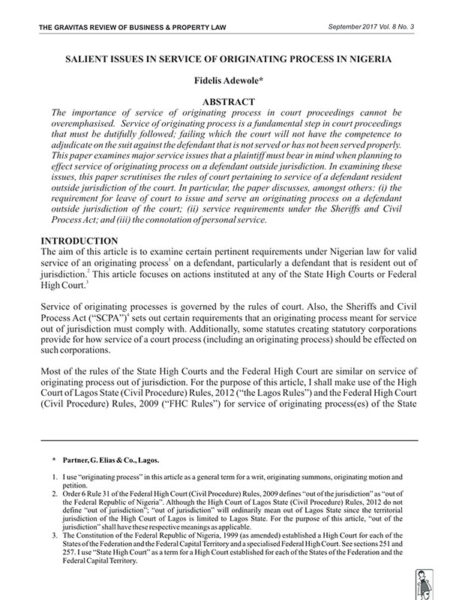
Salient Issues in Service of Originating Process in Nigeria
0₦2,500.00Fidelis Oyewole, Partner, G. Elias & Co in his article, “Salient Issues in Service of Originating Process in Nigeria” explores the world of service of originating processes with a compendium of rules and rulings, to help the practitioner navigate the somewhat arcane terrain of service. In particular, he scrutinises the rules of court pertaining to service of a defendant resident outside jurisdiction, the requirement for leave of court to issue and serve a defendant outside jurisdiction, service requirements under the Sheriffs and Civil Process Act, and the connotation of personal service.
-
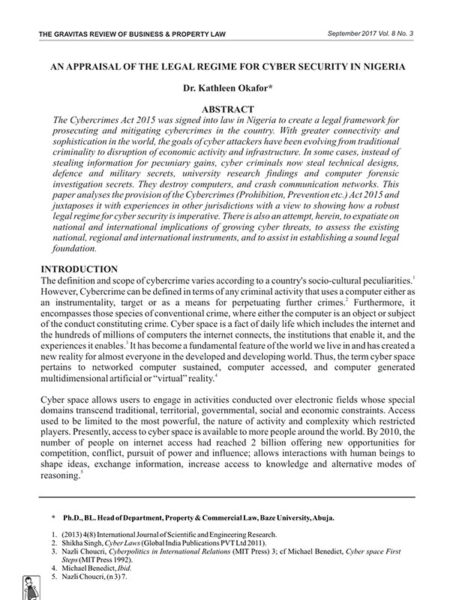
An Appraisal of the Legal Regime for Cyber Security in Nigeria
0₦2,500.00With greater connectivity and sophistication, the goals of cyber attackers have been evolving from traditional criminality to disruption of economic activity and infrastructure. In some cases, instead of stealing information for pecuniary gains, cyber criminals now steal technical designs, defence and military secrets, university research findings, and investigation secrets. Dr. Kathleen Okafor, Head of Department, Property & Commercial Law, Baze University, Abuja in her article, “An Appraisal of The Legal Regime for Cyber Security in Nigeria”, comprehensively reviews the existing national legal regime for cyber security, and assesses how regional and international instruments seek to make the world a safer place.
-
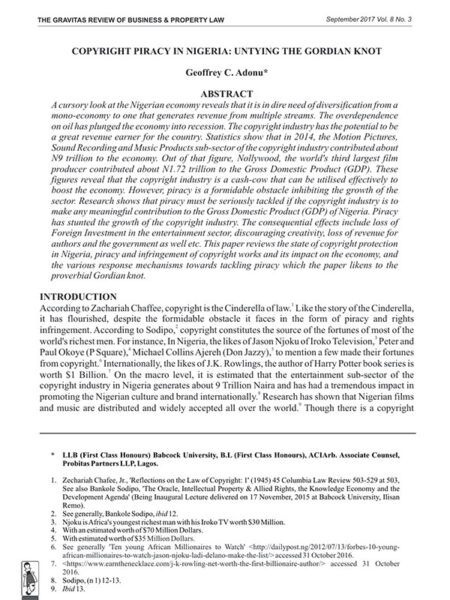
Copyright Piracy in Nigeria: Untying the Gordian Knot
0₦2,500.00Geoffrey Adonu, Counsel, Probitas Partners LLP in his article, “Copyright Piracy in Nigeria: Untying the Gordian Knot”, notes that piracy is a monstrous impediment that has stunted the growth of the copyright industry. The consequential effects include loss of investment in the entertainment sector, loss of revenue for authors and the government, and discouragement of creativity. Adonu reviews the state of copyright protection in Nigeria, piracy and infringement of copyright works, and, borrowing from international best practices, the response mechanisms that can be employed in tackling piracy which he likens to the proverbial Gordian knot.
The Gravitas Review of Business & Property Law



